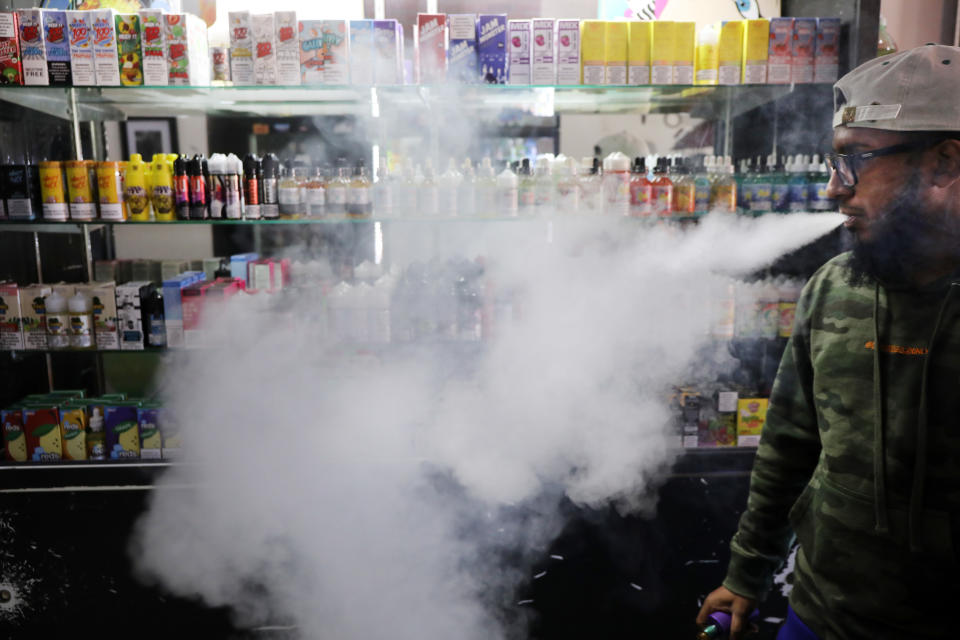How vaping has caught on 'like wildfire' among teens
Vaping has become what some are calling an epidemic across the country as users are falling ill with a mysterious lung injury. So far eight vaping-related deaths have been reported in the U.S.
Square in the center of the controversy is Juul, one of the largest sellers of vape pens, and Altria Group (MO) is a minority investor.
“What Juul and other companies have been doing is trying to introduce other flavors to get existing smokers to quit smoking,” says Rich Dorment, editor-in-chief at Men’s Health magazine. “One of the ways they do that is to make vaping more attractive, so you have flavors like menthol and others that make it – for actual adults, the intended audience – more palatable and exciting. But what has happened unfortunately, it’s caused it to catch on like wildfire among teenagers.”
With flavors like bubblegum and mango, many say it’s hard to believe teens aren’t the intended target. According to the CDC, more than 3 million high school students are vaping.

‘A loophole that swallows the elimination of vaping flavors’
The alarming fad prompted Michigan and New York to ban the sale of flavored e-cigarettes. And the Trump administration is moving closer to a federal ban on all flavored vaping liquid. But on Sunday, Sen. Charles Schumer, (D-NY) said there is a big loophole.
“There's one big problem, there is a possible loophole where any company can apply for an exception, and that could be a loophole that swallows the elimination of vaping flavors,” said Schumer. "Close those loopholes. Don't let them happen. Ban all flavors from e-cigarettes because it's the flavors that attract kids."
Just a week ago, the Centers for Disease Control launched an investigation.
“CDC has made it a priority to find out what is causing this outbreak of e-cigarette or vaping-related injuries and deaths,” said CDC Director Robert Redfield, M.D. in a statement on its website.

A quarter of high school seniors have vaped
A quarter of high school seniors say they have used nicotine vaping products in the last month, according to a New England Journal of Medicine report. “And usage among teens has more than doubled since 2017,” said Dorment. “There’s a huge problem and particularly with Juul they cannot keep e-cigarettes away from teenagers, and until they’re able to do that the government has to get really serious about it.”
On the heels of all this, Walmart said last week it will pull e-cigs from its shelves. In an internal memo Walmart (WMT) said, “Given the growing federal, state and local regulatory complexity and uncertainty regarding e-cigarettes, we plan to discontinue the sale of electronic nicotine delivery products at all Walmart and Sam’s Club U.S. locations.”
Walmart is “joining RiteAid (RAD) and Costco (COST) and other major retailers and saying you know what, we’re fine with actually selling tobacco cigarettes but we’re not going to be stocking these vaping cigarettes anymore,” said Dorment.
“The industry has grown so quickly and so fast that nobody has really had a chance to wrap their heads around it,” said Dorment. “They have not found a way to keep it away from teenagers, until they can do that they have a serious problem on their hands.”
A previous version of this story said Juul was owned by Altria; Altria has a minority stake in the company.
Tracey Marx Bernstein is a senior producer at Yahoo Finance.
Read more:
'Deep pockets': Lawmaker on why Congress, Trump administration haven't acted to curb vaping
Vaping device CEO calls for government regulation of industry after sixth vaping-related death
Outgoing FDA chief: Altria bait-and-switched me with $12.8 billion Juul investment
Follow Yahoo Finance on Twitter, Facebook, Instagram, Flipboard, SmartNews, LinkedIn, YouTube, and reddit.
